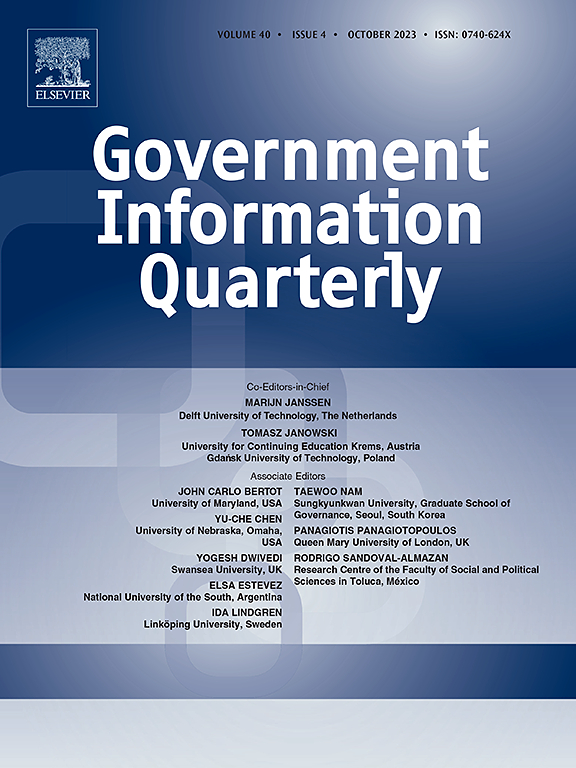战争中的适应性治理:乌克兰克服挑战并加强协作式数字服务提供
IF 10
1区 管理学
Q1 INFORMATION SCIENCE & LIBRARY SCIENCE
引用次数: 0
摘要
本案例研究探讨了数字服务的共同生产如何有助于重新构建协作治理的制度结构,从而有效应对集体威胁。本研究探讨了协作治理和数字技术在乌克兰持续战争中确保公共服务提供方面的作用。该研究重点关注Diia平台和地方政府与民间社会组织之间的服务合作,强调了数字工具如何在战争造成的极端危机下实现适应性治理。通过分析数字技术支持的公共服务协同生产实践中的制度动态,本研究揭示了极端危机条件下社会适应性治理的联合能力。本研究以第聂伯罗彼得罗夫斯克地区为实证案例,运用奥斯特罗姆的制度分析与发展(IAD)框架来考察政府和民间社会合作提供公共服务如何促进了制度变革和适应。调查结果有助于就当前极端危机中的治理问题展开更广泛的讨论,为受冲突影响地区提供了宝贵的见解,并强调了灵活、数字化的制度安排对维持公共服务提供的重要性。本文章由计算机程序翻译,如有差异,请以英文原文为准。
Adaptive governance amidst the war: Overcoming challenges and strengthening collaborative digital service provision in Ukraine
This case study explores how co-production of digital services contributes to a re-framed institutional structure for collaborative governance to respond effectively to collective threats. This study explores the role of collaborative governance and digital technologies in ensuring public service delivery amidst the ongoing war in Ukraine. Focusing on the Diia platform and co-production of services between local government and civil society organizations, the research highlights how digital tools have enabled adaptive governance under extreme crisis posed by the war. By analyzing institutional dynamics in collaborative practices of co-production of public services enabled by digital technologies, this study sheds light on joint capacity for adaptive governance in societies under extreme crisis conditions. Using the Dnipropetrovsk region as an empirical case, this research applies Ostrom's Institutional Analysis and Development (IAD) framework to examine how government and civil society collaborations to deliver public services have fostered institutional changes and adaptation. The findings contribute to broader discussions on governance in on-going extreme crises, offering valuable insight into conflict-affected areas and emphasizing the importance of flexible, digitally enabled institutional arrangements for sustaining public service delivery.
求助全文
通过发布文献求助,成功后即可免费获取论文全文。
去求助
来源期刊

Government Information Quarterly
INFORMATION SCIENCE & LIBRARY SCIENCE-
CiteScore
15.70
自引率
16.70%
发文量
106
期刊介绍:
Government Information Quarterly (GIQ) delves into the convergence of policy, information technology, government, and the public. It explores the impact of policies on government information flows, the role of technology in innovative government services, and the dynamic between citizens and governing bodies in the digital age. GIQ serves as a premier journal, disseminating high-quality research and insights that bridge the realms of policy, information technology, government, and public engagement.
 求助内容:
求助内容: 应助结果提醒方式:
应助结果提醒方式:


